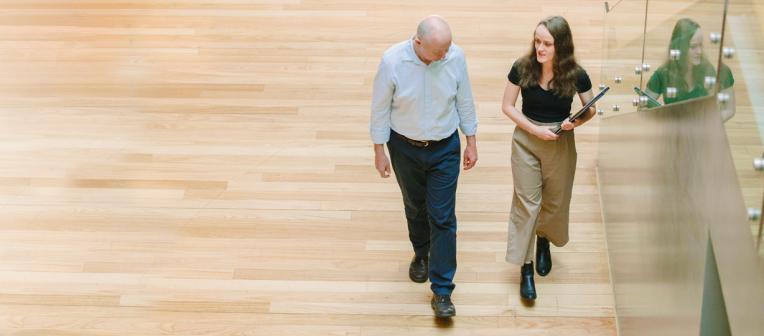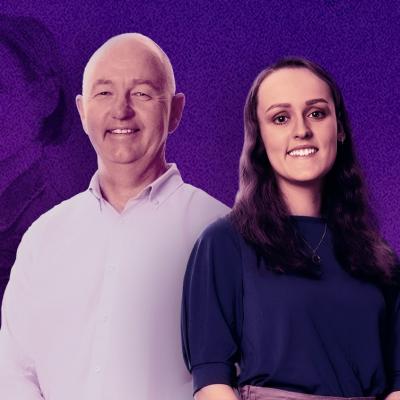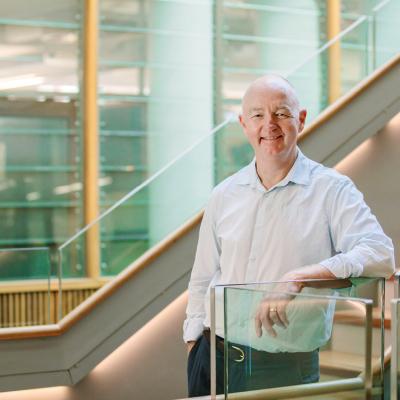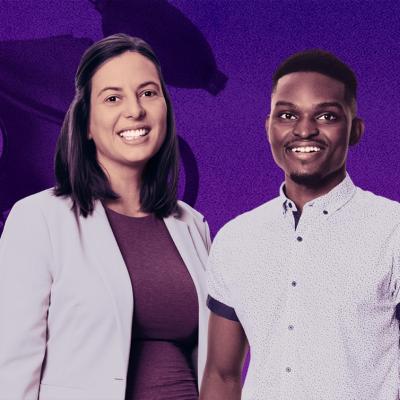Considering studying public health at university? You may have lots of questions. We're here to help you find answers.
- Why study public health?
- What do you study in public health?
- Is a public health degree worth it?
- What jobs can I do with a public health degree?
We've interviewed a UQ student and academic to find out. Bianca is a public health student and Associate Professor Simon Reid is a lecturer in the School of Public Health. They’ve teamed up to answer some of your questions and uncover how UQ can give you the skills you need to face the future, even when you don't know exactly what the future will look like.
Let's find out if public health sounds like the study area for you.
Since this article's original publish date in August 2020, Bianca has graduated from her Bachelor of Health Sciences and is now studying a Master of Public Health. She has worked extensively on the COVID-19 pandemic response at both a federal and jurisdictional level, and is currently working as a Senior Policy Officer at the Australian Government Department of Health and Aged Care.
What are some of the coolest jobs your former students are doing?
Simon: I have a student who went from our master's program straight into the World Health Organisation in Geneva, and I had another student who now runs a tuberculosis control program in Africa.
What's been the most unexpected thing you've been happy to discover at UQ?
Bianca: For me, it was discovering the community of students at UQ. So not only within my lectures and tutorials where I have been building up a really strong foundation with my friends who I'm hoping someday will be my colleagues, but also in the extracurricular activities that UQ provides. There's so many different organisations, clubs and opportunities that you can find at UQ. I've been very involved in student activity and life on campus myself and I think it's enriched my student experience tremendously.
What is it about UQ’s approach that makes us the most employable graduates in the state?
Simon: UQ is unique in the investment in our teaching programs, particularly the online programs and the investment in blended learning, innovative teaching practices and work integrated learning. This has really improved our capacity to deliver an experience that helps people transition to the workforce and doesn't leave them at the end with a sense that they are taking the next step by themselves.
It's a very positive environment that's focused on student employability, and I think that's probably what I consider to be one of the most unique perspectives.
Why did you choose to work in public health?
Simon: Public health is a fascinating field and it's so important for managing health in the future. Public health focuses on populations and bigger picture problems, and less on the individual. The reason that's important is a lot of the simple health problems we face have been solved with technologies or vaccines.
What we're left with now are these complex problems that are really difficult – we call them wicked problems. What we like to think in public health is that we’re saving lives 1000 at a time rather than focusing on one individual. Public health is essential because prevention is better than a cure. Prevention is something that enables us to redirect all of our efforts into other areas rather than spending time on things that we can prevent.
What does a day in the life of a public health student look like?
Bianca: I personally think it looks quite great. We have a whole lot of different things that make up a day. Often, you'll start by going to one of your lectures where you get to hear fantastic researchers in their fields (such as yourself, Simon) talk about the knowledge they've gained through their research.
Then we often have a few lectorials, which is one of my favourite deliveries. It gives the option to engage and interact with the presenter about what they've done with their knowledge and how they've applied that in a practical sense. It also gives us as students a chance to take the knowledge that we've gained from our lectures and pracs, and really put it into perspective and a practical interactive approach towards solving real-world problems that are presented to us.
We also go to quite a few practicals to get a hands-on understanding of the different ways that we can implement programs, as well as understanding science in a hands-on manner. But my favourite part of the day is always being able to catch up with friends in the library and study groups and getting the sneaky coffee between lectures and tutorials as well.

What opportunities do your students have to get hands on experience in our industry?
Simon: We have a very strong link to industry and our industry is very broad. Public health is not a specific discipline, so our graduates have a much broader range of opportunities. We have government and non-government, industry and private sector opportunities. In our undergraduate program, we have a work placement which is across one semester. A number of our students get their first practical internships and even their first job from these placements.
Then in our postgraduate program, we've implemented a work placement program to ensure that our postgraduate students have the same opportunities.
How does the way you learn at UQ teach you the skills you need to face an unknown future?
Bianca: My program has really opened my eyes to how important it is to be adaptable within your work. This is going to be crucial to help tackle emerging health problems. My lecturers are doing fantastic research, and understanding the journey and your research goals is fascinating. This allows us to think about what we're learning, and how it can be adapted to the future.
How do you prepare students for the future when we don't know what the future looks like?
Simon: We don't know what the future looks like, but we do know that the future is becoming more complex, and the problems and solutions we're dealing with are more difficult.
We focus on equipping students with the capacity to think and to analyse. So our main emphasis is on ensuring that students are able to look at a problem and really understand the context, because with the context comes an understanding of the solutions that are available, and an appropriate way of managing those.
We really work very hard to ensure that there's a diversity of experiences in our programs and also that students are given lots of opportunities to apply knowledge and to demonstrate that they can think – it's really the critical step.
What do you think employers in the health industry are looking for and how do you think UQ has equipped you with the skills?
Bianca: I think employers in the health industry value the ability to be adaptive – being able to take the knowledge you've gained from your studies and your career and adapting it to different situations. I think they would also value creativity and having the ability to look at things from a different perspective. Being able to engage with lecturers and guest presenters allows you to understand some of these different perspectives.
If you could give me one piece of advice that would set me apart as a job candidate, what would it be?
Simon: Understand your industry, understand where you seek to go and build networks that enable you to get there and provide you with support. A large proportion of our graduates get their first job through their networks. That network could be through internships, placements and also through your lecturers.
One other piece of advice is to make yourself useful. A job is about the relationship between what you can offer an employer and what they offer you, and it's very important that people think about what they offer to the employer to make sure that they really have the right expectations going into that job. It's getting harder, but it's also getting easier for people who really do learn the right way of approaching these things.
What have you learnt about yourself since you began your studies at UQ?
Bianca: UQ has really helped me develop my confidence and leadership abilities. I never thought that I would be at uni and be the president of one of the student clubs on campus. I never thought I'd have the confidence to interact with my lecturers and build up my network. It's really provided me with so many different avenues that were never possible in my mind when I graduated high school.
Explore the Bachelor of Science majoring in public health and Bachelor of Health Sciences specialising in public health or discover what it's really like to study other programs at UQ.






